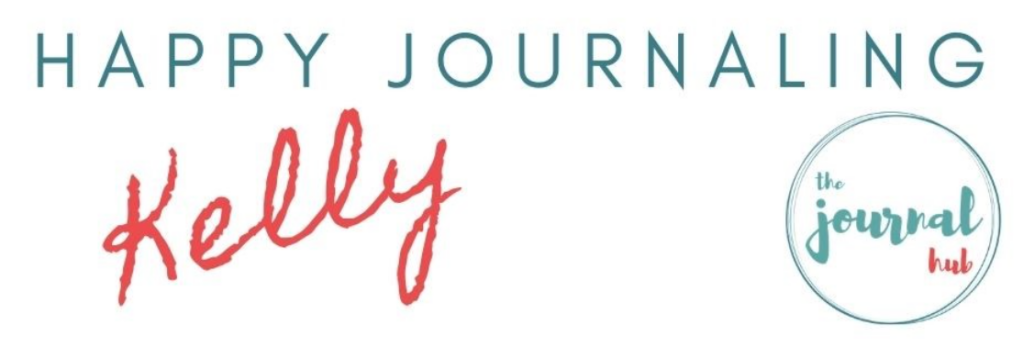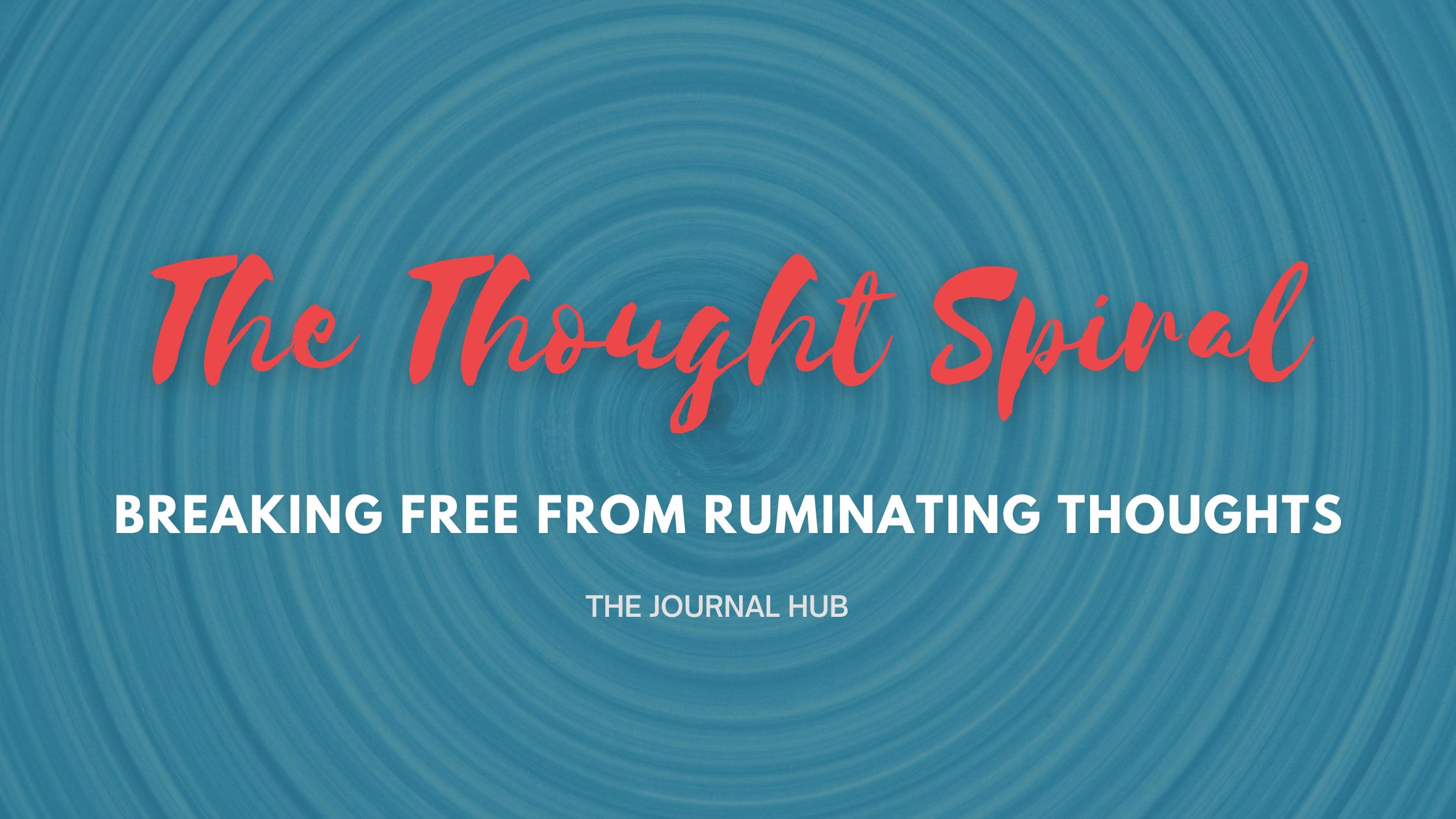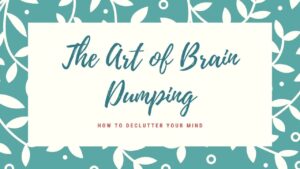This time of year is a time of reflection but sometimes that can lead to going down a spiral of ruminating thoughts – that endless loop of thoughts circling our mind, replaying past events or worrying about future outcomes. At times this may feel like you are “working through” something, it often does more harm than good. In this post we explore why ruminating thought are detrimental to your well-being and how journaling can serve as a powerful tool to help you break free from this cycle. We will also examine other effective strategies to stop ruminating thoughts.
Why ruminating thoughts can be harmful

Rumination can feel productive at first, but it often leads to negative consequences such as:
Increase Stress: Overthinking magnifies problems and amplifies stress, making situations seem worse than they are.
Emotional Drain: Constantly replaying thoughts can lead to feelings of frustration, sadness or even hopelessness.
Reduced Problem-Solving: Rumination keeps you stuck in a loop of thinking without taking action, which hinders your ability to resolve issues.
Impact on Mental Health: Prolonged rumination is linked to anxiety, depression and other mental health challenges.
Breaking free from rumination is crucial for your emotional and psychological well-being. Fortunately, there are practical tools to help, with journaling being one of the most effective.
How journaling helps combat ruminating thoughts
Journaling allows you to externalise your thoughts, creating a space where you can process them constructively. Here’s how it works:
Clarifies your thoughts: Writing helps you untangle complex emotions and pinpoint the root cause of your worries.
Provides Perspective: Seeing your thought on paper can make them feel less overwhelming and more manageable.
Encourages Problem-Solving: Journaling fosters a shift from passive rumination to active reflection, helping you identify actionable steps.
Reduces Emotional Intensity: The act of writing can act as a release, alleviating the emotional burden associated with persistent thoughts.
Promotes Mindfulness: Journaling can ground you in the present moment, pulling you out of the “what-ifs” and “should-haves.”
Choose your thoughts carefully. Keep what brings you peace, release what brings you suffering. And know that happiness is just a thought away.
Nishan Panwar
Journaling prompts to Help stop the spiral
Using prompts can guide your journaling practice and help you break free from rumination. Here are some effective prompts to try:
Identifying the Root Cause:
“What exactly am I worried about, and why does it feel significant?”
“What triggered these thoughts?”
Shifting Perspective:
“What would I say to a friend who had these same thoughts?”
“How might I view this situation a year from now?”
Focusing on Solutions:
“What can I do right now to address this concern?”
“What steps are within my control to improve this situation?”
Challenging Negative Thoughts:
“What evidence do I have that this thought is true?”
“What evidence do I have that contradicts this thought?”
Practicing Gratitude:
“What are three things I am grateful for today?”
“What positive things have happened recently that I can focus on?”
Letting Go:
“What is one thing I can release today that no longer serves me?”
“What thoughts or worries can I choose to let go of right now?”
Reframing the Narrative:
“What is one positive thing I can learn from this situation?”
“How can I turn this challenge into an opportunity for growth?”
Grounding in the Present:
“What are five things I can see, hear, or feel around me right now?”
“What does my ideal day look like, and how can I take steps toward it?”
Other things you can do to stop ruminating thoughts
In addition to journaling, here are several other effective strategies to help you break free from rumination:
- Practice Mindfulness and Meditation:
- Engage in mindfulness exercises like deep breathing or body scans to focus on the present moment.
- Guided meditations can help redirect your attention away from intrusive thoughts.
- Engage in Physical Activity:
- Exercise releases endorphins, which improve mood and reduce stress.
- Activities like yoga or walking in nature can be particularly grounding.
- Distract Yourself with a Positive Activity:
- Pick up a hobby, read a book, watch a movie, or listen to music to shift your focus.
- Creative outlets like painting or cooking can also help.
- Challenge Negative Thoughts:
- Write down recurring negative thoughts and actively dispute them with evidence-based reasoning.
- Ask yourself, “Is this thought helping me or hurting me?”
- Talk to Someone You Trust:
- Sharing your thoughts with a friend, family member, or therapist can provide new perspectives and emotional support.
- Set Boundaries on Overthinking:
- Allocate a specific “worry time” each day to address concerns, then consciously redirect your attention afterward.
- Practice Gratitude:
- Reflect on or write down things you’re grateful for. Shifting to a positive mindset on
- Identify triggers that lead to rumination, such as social media or certain environments, and reduce your exposure to them.

When I catch myself in a rumination loop, I ask myself if this is helpful to what I want to achieve today? If not, I do a count down from 5. 5, 4, 3, 2, 1 move on. I find this breaks the loop long enough for me to refocus. Give it a go and let me know if it works for you.
Final Thoughts (not of the Ruminating kind)
Ruminating thoughts can feel like an inescapable storm (I’ve been there), it can be scary and hard to pull yourself out of the spiral, but tools like journaling and other strategies can help you navigate through them with clarity and purpose. By writing your thought down, engaging in mindfulness, or seeking support you can shift from a state of passive worry to active problem solving, ultimately freeing yourself from the mental fog.
Take a moment today to try one of these techniques – whether it’s journaling, going for a walk, or practicing gratitude. Breaking the cycle of rumination is a process, but with consistent practice, it’s entirely possible to reclaim your mental well-being.
If you are struggling with getting out of the rumination spiral, feel free to reach out.









